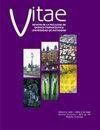Electronic Nose, Tongue and Eye: Their Usefulness for the Food Industry
Q3 Pharmacology, Toxicology and Pharmaceutics
引用次数: 4
Abstract
Background: The electronic nose, tongue, and eye are futuristic technologies that have been used for many years; they have been gaining market in different types of industries and can increasingly be found in the food area; their function is to determine sensory characteristics (smell, aroma, and flavor) and objective visuals, without the subjectivity that can be represented by sensory analysis by people (the study that can complement the analysis of machines, without being exclusive). Objectives: Find the main generalities of these mechanisms, their sensors, software, mechanism of action, and applications within the food industry. Methods: A search was carried out in the main databases of indexed articles, with terms that allowed collecting the necessary information, and 89 articles were used that met different inclusion criteria. Results: The main outcomes were to understand the operation of each of these technologies, what their main components are, and how they can be linked in the beer, wine, oil, fruit, vegetable, dairy, etc. industry to determine their quality, safety, and fraud. Conclusions: The use of electronic nose, tongue, and eye is found in more food industries every day. Its technology continues to evolve; the future of sensory analysis will undoubtedly apply these mechanisms due to the reliability, speed, and reproducibility of the results.电子鼻、电子舌和电子眼:它们在食品工业中的用途
背景:电子鼻、电子舌和电子眼是已经使用多年的未来技术;它们已经在不同类型的行业中获得了市场,并且越来越多地出现在食品领域;它们的功能是确定感官特征(嗅觉、香气、风味)和客观视觉,没有人的感官分析所能代表的主观性(可以补充机器分析的研究,而不是排他性的)。目的:找到这些机制的主要概况,它们的传感器,软件,作用机制,以及在食品工业中的应用。方法:在检索文献的主要数据库中进行检索,检索到能够收集必要信息的检索词,共检索到89篇符合不同纳入标准的文献。结果:主要的结果是了解每一种技术的运作,它们的主要成分是什么,以及它们如何在啤酒、葡萄酒、石油、水果、蔬菜、乳制品等行业中联系起来,以确定它们的质量、安全性和欺诈。结论:电子鼻、电子舌、电子眼的使用在越来越多的食品行业中得到应用。它的技术在不断发展;由于结果的可靠性、速度和可重复性,感官分析的未来无疑将应用这些机制。
本文章由计算机程序翻译,如有差异,请以英文原文为准。
求助全文
约1分钟内获得全文
求助全文
来源期刊

Vitae
PHARMACOLOGY & PHARMACY-
CiteScore
1.20
自引率
0.00%
发文量
0
审稿时长
>12 weeks
期刊介绍:
The journal VITAE is the four-monthly official publication of the School of Pharmaceutical and Food Sciences, and its mission is the diffusion of the scientific and investigative knowledge in the various fields of pharmaceutical and food research, and their related industries. The Journal VITAE is an open-access journal that publishes original and unpublished manuscripts, which are selected by the Editorial Board and then peer-reviewed. The editorial pages express the opinion of the Faculty regarding the various topics of interest. The judgments, opinions, and points of view expressed in the published articles are the responsibility of their authors.
 求助内容:
求助内容: 应助结果提醒方式:
应助结果提醒方式:


